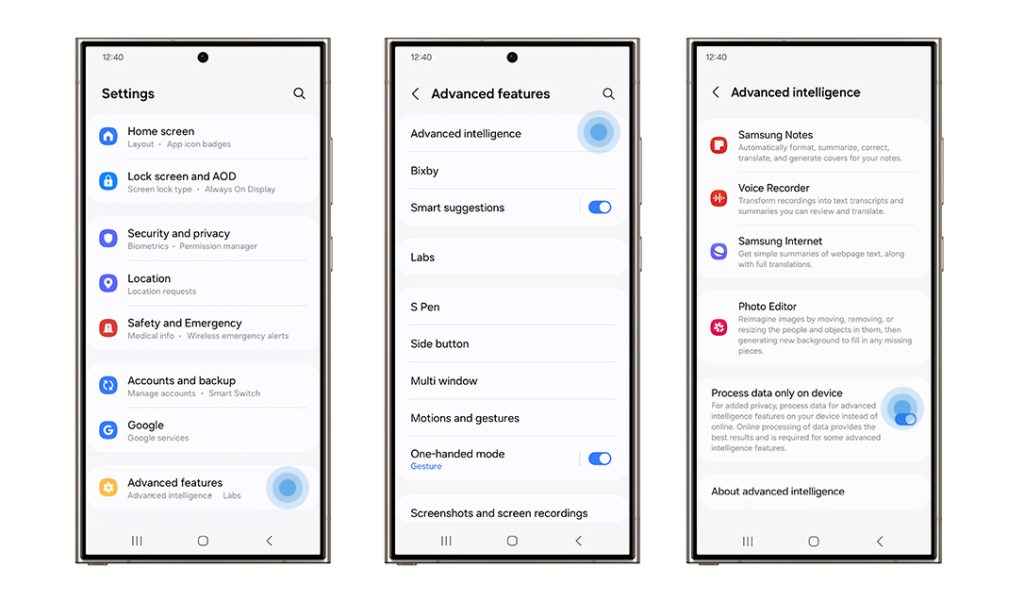How AI hardware advanced privacy debate in 2024

As on-device AI technology continues to evolve, privacy has become one of its defining features. In 2024, companies like Apple, Google, and Samsung took significant steps to safeguard user data through localized AI processing, ensuring sensitive information stays on the device rather than being exposed to external servers. This shift marks a substantial move towards ensuring user autonomy over their data and boosting security without relying on cloud-based systems. Here’s how various companies incorporated on-device AI for enhanced privacy in 2024.
 Survey
SurveyApple’s On-Device AI Privacy
Apple has long been a champion of user privacy, and with the introduction of “Private Mode” in iOS 17, this stance was reinforced. The mode processes all voice commands locally on the device, significantly reducing the exposure of user data to external threats. This shift eliminated the need for voice data to be transmitted to Apple’s servers, making voice commands more secure. At the heart of this advancement is Apple’s custom-designed Neural Engine, capable of processing requests in real-time with minimal latency. As the company increasingly shifts its AI capabilities to the device, it aims to provide a seamless user experience while maintaining a strong privacy framework.

Moreover, the integration of the Secure Enclave, a specialized chip designed to handle sensitive data, added an additional layer of encryption to all user interactions. This encryption ensures that any data captured by Siri, whether for voice recognition or other features, is isolated from the broader system and kept protected within its own secure space. With these innovations, Apple took an important step in ensuring its customers’ privacy while enhancing the performance of its devices through the power of on-device AI.
Also Read: Apple Intelligence will not sell iPhones in India: Here’s why
Google’s Titan Security Chip
In 2024, Google continued to expand the capabilities of its Titan Security Chip, integrating AI to enhance device security and encryption protocols. The Titan chip now utilizes on-device AI for real-time threat detection, scanning for unusual activity or system anomalies indicative of unauthorized access attempts. This integration significantly boosts the device’s ability to detect threats without needing to rely on cloud-based updates, ensuring that Google’s Android devices maintain a high level of security even in areas with limited or no internet connectivity.

Moreover, Google introduced machine learning models that use AI to predict potential vulnerabilities, allowing the device to proactively prevent threats before they even occur. This predictive security model makes use of local AI processing, ensuring that sensitive data remains on the device while proactively protecting it against emerging threats. Google’s Titan Security Chip also offers end-to-end encryption, protecting user data at all levels, from initial collection to storage and transmission, making it one of the most secure solutions in the industry.
Samsung Knox AI
Samsung’s Knox security platform, known for its robust encryption features, saw even further integration of AI-driven security measures in 2024. This update allowed Knox to not only secure devices but also detect and mitigate threats in real time. The platform now uses on-device AI to monitor apps and system behaviors for suspicious activity that could indicate a security breach, such as the presence of malware or unauthorized data access.

In addition to these advanced monitoring features, Samsung’s Knox AI dynamically adjusts app permissions based on real-time analysis of behavior. If the system detects abnormal app behavior, such as excessive data requests or attempts to access sensitive information, Knox will restrict the app’s access, blocking potential threats before they have the chance to cause damage. This localized AI approach ensures that the device remains secure even if the user is offline or in environments where cloud-based protection is unavailable. Furthermore, Samsung’s collaboration with industry partners ensures that Knox AI continually adapts to evolving global security standards, maintaining its reputation as a comprehensive mobile security solution.
Also Read: NVIDIA Jetson Orin Nano explained: Will it make AI more accessible?
On-Device AI for Biometric Data
Biometric data, such as facial recognition and fingerprints, has become an essential element of device security. In 2024, companies integrated more AI-driven processes into these systems to enhance both performance and privacy. The Google Pixel 9, for example, introduced an upgraded face unlock system that utilized on-device AI to process facial data directly on the device. This method eliminates the need for sensitive biometric data to leave the device, ensuring user privacy is preserved.
The new system uses Google’s edge TPU (Tensor Processing Unit), which handles the intensive AI processing required for real-time facial recognition. By using this localized AI, the Pixel 9 can achieve fast and accurate face unlock functionality without compromising battery life or security. Additionally, this approach allows the system to work efficiently in diverse lighting conditions, offering enhanced performance over previous models.
AI-Powered Data Masking
In response to growing privacy concerns, several privacy-focused applications have integrated on-device AI to protect sensitive information in real-time. One prominent example is Signal, which implemented AI-driven data masking to automatically blur or redact screenshots and recordings that contain sensitive details. This feature works entirely on-device, meaning the sensitive data never leaves the user’s device for external processing, thus ensuring privacy.

Additionally, this AI-powered data masking extends to personal chats, where images and videos containing identifiable information are automatically obscured. By leveraging on-device AI, Signal offers users greater control over their private communications while maintaining security against unwanted data leaks. This localized approach to privacy ensures that even if sensitive content is shared, it is anonymized or obscured before it reaches its intended recipient.
Also Read: Three smartphone innovations of 2024 that made us go wow!
Team Digit
Team Digit is made up of some of the most experienced and geekiest technology editors in India! View Full Profile